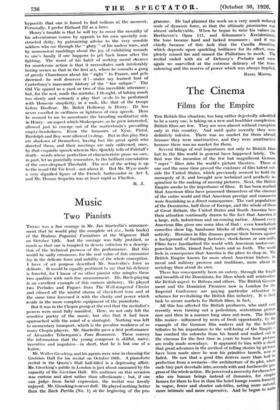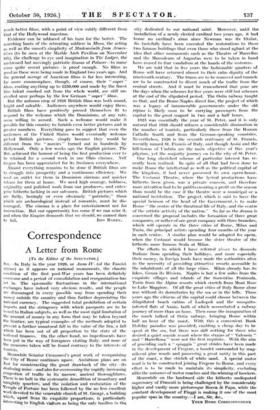The Cinema
Films for the Empire
THE British film situation, too long rather dejectedly admitted to be a sorry one, is taking on a new and healthier complexion. British films are few. They are seen almost without exception only in this country. And until quite recently they were definitely inferior. There was no market for them abroad because they were unattractive, and they were unattractive because there was no market for them.
Several things of real importance not only to British films but to the film world in general have happened lately. The first was the incursion of the few but magnificent German
" super " films into the world's picture theatres. These at one and the same time proved the existence of film talent out- side the United States, which previously seemed to hold the
monopoly of it, and brought new technical and aesthetic in- spiration to the making of moving pictures. Next, the British Empire awoke to the importance of films. It has been realized that American films have possessed themselves of the cinemas of the entire world and that American prestige and commerce were flourishing as a direct consequence. The vast populations of the Dominions, half those of Europe, and the whole of those of Great Britain, the United States and South America have
their attention continually drawn to the fact that America is
a large, rich, industrious and on-coming nation. Almost every American film gives one some idea of that : even knockabout comedies show big, handsome blocks of offices, teeming with activity. Heroines in film dramas pursue their heroes against a background of bustling factories, stock-farms or saw-mills.
Films have familiarized the world with American motor-cars, porcelain baths, tinned food, boots and so forth. The world feels in consequence that America is the place to shop in. The British Empire knows far more about American history, its naval and military prowess and traditions, more about its sociology than about its own.
There has consequently been an outcry, through the length and breadth of the Dominions, for films which will reintroduce the British aspect to Britons and others. The British Govern- ment and the Dominion Premiers now in London for the Imperial Conference are paying particular attention to schemes for revitalizing the British film industry. It is their task to secure markets for British films, in fact.
All this has affected the British producers, who until very recently were turning out a pedestrian, sententious picture now and then in a manner long since out-worn. The British film maker—influenced by news of fresh opportunity, by the example of the German film makers and by the belated tributes to his importance. to the well-being of the Empire- has combed the cobwebs from his beard and rushed out to the cinemas for the first time in years to learn how pictures are really made nowadays. It appeared to him with a shod that great advances in the method of telling stories by picture have been made since he won his primitive laurels, now su faded. He saw that a good film derives more than half its perfection from a scenario—the architecture of its plot, where each tiny part dovetails into, accords with and furthers the pro' press of the whole action. He perceived a necessity for characters who are human beings instead of dummies, for simpler houses for them to live in than the hotel lounge rooms fomierly in vogue, fewer and shorter sub-titles, acting more natural, more intimate and more expressive. And he began to raal`e much better films, with a point of view -subtly different froth
that of the Hollywood inaestros. ' " •
Evidence can be 'adduced of his turn for the better. • The Marching boots of the retreating soldiers in Mons, the acting as well as the smooth simplicity of Mademoiselle from (to be seen at the Marble Arch 'Pavilion on November gth), the challenge-to eye and imagination in•Thi Lodger, th6 unstressed but movingly phtriotic drania of Palaver-to name some quite recent picturesis proof enough. • No filmS' as good these were being made in England two years ago. And the 'general average of American films is far less interesting, Tar more commonplace, though, of course, their " super " .filins, costing anything up to £250,000 and made by the finest film talent combed out from the whole world, are still un- rivalled save perhaps by the few German " super" films.
But the autumn crop of 1926 British films was both sound, bright and saleable. Audiences anywhere would enjoy them.
• British films have 'positiVely proved themselves fit to respond to the welcome which the Dominions, at any rate, seem willing to accord. Such a welcome would make it possible for this country to furnish even better pictures and in greater numbers. Everything goes to suggest that even the audiences of the United States would eventually welcome picked British pictures, simply because they would be different from the " movies " turned out in hundreds by Hollywood. Only a few weeks ago the English picture, The 'Rat, achieved the honour of being the first production ever to be retained for a seeond week in one Ohio 'cinema. Nell Gwynn has been-appreciated for its freshness everywhere.
Almost everything remains to be done if British films are to struggle into prosperity and a continuous efficiency. We need an outlet for them in Dominion cinemas and quicker -release for them at home. We need high courage, boldness, originality and polished work from our producers, and enter- prise hitherto lacking in our salesmen. British pictures which arc 'flatly, boringly - or even obviously " patriotic," those which are archaeological instead of romantic, must be dis- Couraged. The cinema is a place for entertainment not for instruction. But our opportunity has come if we can seize it, and when the Empire demands that we should, we cannot dare



























































 Previous page
Previous page